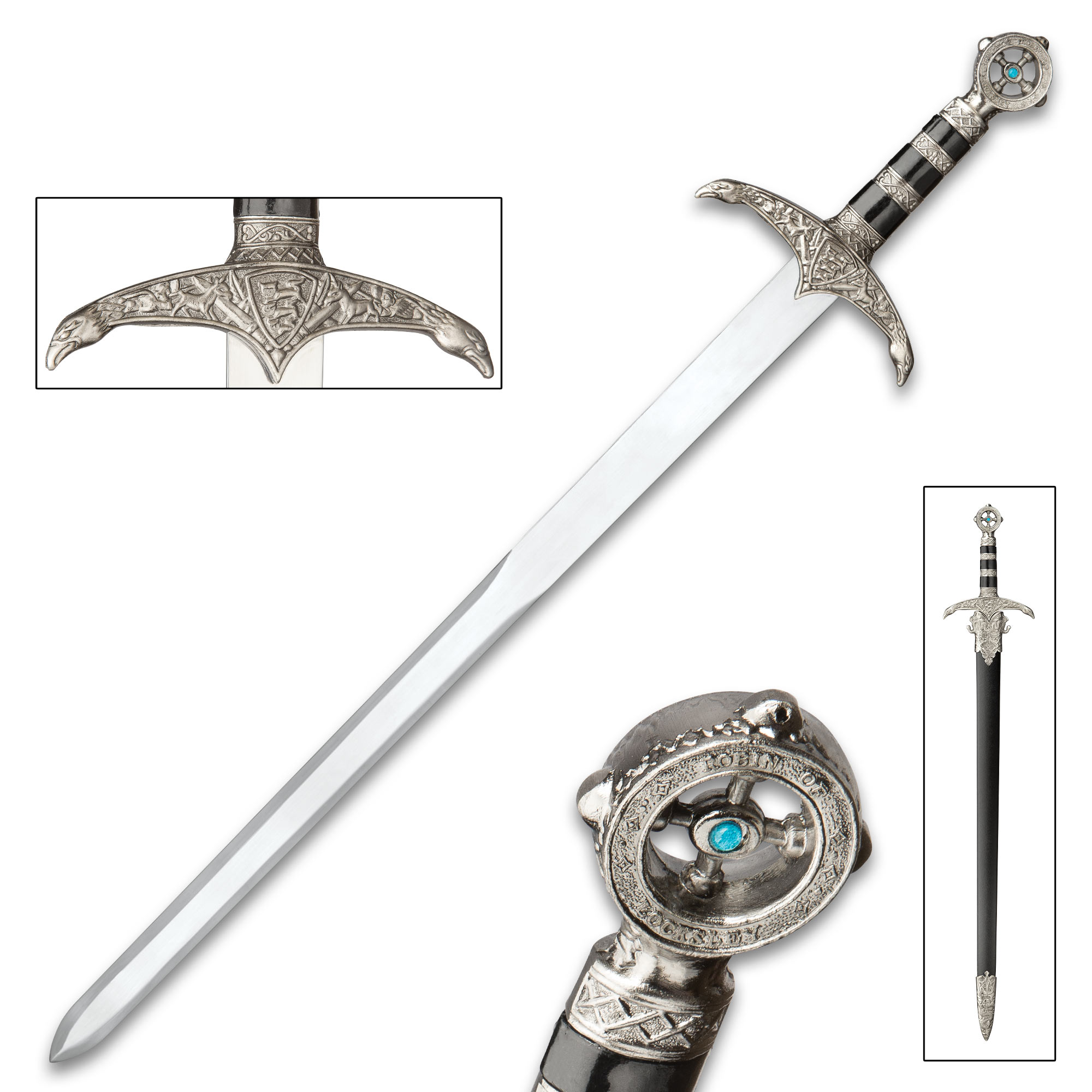

More about Arthur
In a forest near the home of the Grail and its Knights, Gurnemanz, eldest Knight of the Grail, wakes his young squires and leads them in prayer. He sees Amfortas, King of the Grail Knights, and his entourage approaching. Amfortas has been injured by his own Holy Spear, and the wound will not heal.
Gurnemanz asks the lead Knight for news of the King's health. The Knight says the King has suffered during the night and is going early to bathe in the holy lake. The squires ask Gurnemanz to explain how the King's injury can be healed, but he evades their question and a wild woman – Kundry – bursts in. She gives Gurnemanz a vial of balsam, brought from Arabia, to ease the King's pain and then collapses, exhausted.
Amfortas arrives, borne on a stretcher by Knights of the Grail. He calls out for Gawain, whose attempt at relieving the King's pain had failed. He is told that Gawain has left again, seeking a better remedy. Raising himself somewhat, the King says going off without leave ("Ohn' Urlaub?") is the sort of impulsiveness which led himself into Klingsor's realm and to his downfall. He accepts the potion from Gurnemanz and tries to thank Kundry, but she answers abruptly that thanks will not help and urges him onward to his bath.
The procession leaves. The squires eye Kundry with mistrust and question her. After a brief retort, she falls silent. Gurnemanz tells them Kundry has often helped the Grail Knights but that she comes and goes unpredictably. When he asks directly why she does not stay to help, she answers, "I never help! ("Ich helfe nie!"). The squires think she is a witch and sneer that if she does so much, why will she not find the Holy Spear for them? Gurnemanz reveals that this deed is destined for someone else. He says Amfortas was given guardianship of the Spear, but lost it as he was seduced by an irresistibly attractive woman in Klingsor's domain. Klingsor grabbed the Spear and stabbed Amfortas. The wound causes Amfortas both suffering and shame, and will never heal on its own.
Gurnemanz asks the lead Knight for news of the King's health. The Knight says the King has suffered during the night and is going early to bathe in the holy lake. The squires ask Gurnemanz to explain how the King's injury can be healed, but he evades their question and a wild woman – Kundry – bursts in. She gives Gurnemanz a vial of balsam, brought from Arabia, to ease the King's pain and then collapses, exhausted.
Amfortas arrives, borne on a stretcher by Knights of the Grail. He calls out for Gawain, whose attempt at relieving the King's pain had failed. He is told that Gawain has left again, seeking a better remedy. Raising himself somewhat, the King says going off without leave ("Ohn' Urlaub?") is the sort of impulsiveness which led himself into Klingsor's realm and to his downfall. He accepts the potion from Gurnemanz and tries to thank Kundry, but she answers abruptly that thanks will not help and urges him onward to his bath.
The procession leaves. The squires eye Kundry with mistrust and question her. After a brief retort, she falls silent. Gurnemanz tells them Kundry has often helped the Grail Knights but that she comes and goes unpredictably. When he asks directly why she does not stay to help, she answers, "I never help! ("Ich helfe nie!"). The squires think she is a witch and sneer that if she does so much, why will she not find the Holy Spear for them? Gurnemanz reveals that this deed is destined for someone else. He says Amfortas was given guardianship of the Spear, but lost it as he was seduced by an irresistibly attractive woman in Klingsor's domain. Klingsor grabbed the Spear and stabbed Amfortas. The wound causes Amfortas both suffering and shame, and will never heal on its own.
Gurnemanz asks the lead Knight for news of the King's health. The Knight says the King has suffered during the night and is going early to bathe in the holy lake. The squires ask Gurnemanz to explain how the King's injury can be healed, but he evades their question and a wild woman – Kundry – bursts in. She gives Gurnemanz a vial of balsam, brought from Arabia, to ease the King's pain and then collapses, exhausted.
Amfortas arrives, borne on a stretcher by Knights of the Grail. He calls out for Gawain, whose attempt at relieving the King's pain had failed. He is told that Gawain has left again, seeking a better remedy. Raising himself somewhat, the King says going off without leave ("Ohn' Urlaub?") is the sort of impulsiveness which led himself into Klingsor's realm and to his downfall. He accepts the potion from Gurnemanz and tries to thank Kundry, but she answers abruptly that thanks will not help and urges him onward to his bath.
The procession leaves. The squires eye Kundry with mistrust and question her. After a brief retort, she falls silent. Gurnemanz tells them Kundry has often helped the Grail Knights but that she comes and goes unpredictably. When he asks directly why she does not stay to help, she answers, "I never help! ("Ich helfe nie!"). The squires think she is a witch and sneer that if she does so much, why will she not find the Holy Spear for them? Gurnemanz reveals that this deed is destined for someone else. He says Amfortas was given guardianship of the Spear, but lost it as he was seduced by an irresistibly attractive woman in Klingsor's domain. Klingsor grabbed the Spear and stabbed Amfortas. The wound causes Amfortas both suffering and shame, and will never heal on its own.
Who was King Arthur? Was there really a sword in the stone? Or a Round Table? What about the Lady of the Lake? Here are 11 fabulous facts about the Once and Future King…
There almost certainly was an Arthur – but sadly it was unlikely he was a king. The writings of ninth-century Welsh monk Nennius first refer to Arthur as a fifth-century warrior leading a band of men fighting the invading Saxons – in this sense making him far more like the battling hero of Arthur: Legend of the Sword who learns to fight on the mean streets than the courtly knight of legend.
Three hundred years later, Arthur got a major promotion, when Geoffrey of Monmouth wrote his masterpiece A History of the Kings of Britain. He made Arthur a King who defeated the Saxons and united England, as well as first introducing the magician Merlin and Arthur’s nemesis Mordred. The story became a sensation across Europe and over the next centuries was added to and expanded to include the sword in the stone, the quest for the Holy Grail and all the other elements we know today.
First created by Geoffrey of Monmouth, Merlin the magician has become inseparable from Arthur himself. Guy Ritchie has him as a mysterious, mostly hinted-at figure pulling the strings behind the scenes – which is actually truer to Geoffrey’s original vision than the “right-hand man” he became in later tales. Geoffrey’s Merlin was a combination of several historical and mythical figures, most notably the Welsh prophet Myrddin Wyllt and the Romano-British leader Ambrosius Aurelanius. The result was Merlin Ambrosius, part madman, part magician, part guardian of Albion.
The drawing of Excalibur from the stone, thus proving Arthur to be the true king, is one of the most famous of the Arthurian legends. In King Arthur: Legend of the Sword it shows Arthur to be Uther’s son and the only man able to defeat the evil Vortigern. But did it really happen? Well… sort of. There is an ancient stone thought to date back to at least the Romans at the Museum of London (known as “The London Stone”) which a new King would strike with his sword to declare his right to rule…
Another theory has the sword in the stone myth coming down to an error in the translation of the ancient stories. The Latin word for stone is “saxum”: could it be that Arthur, as the leader who fought the invading Saxons, was originally dubbed “the sword in the Saxons”… which simply got later mistranslated to the “sword in the saxum”?




Check out more at their site redbuble.com!
myth coming down to an error in the translation of the ancient stories. The Latin word for stone is “saxum”: could it be that Arthur, as the leader who fought the invading Saxons, was originally dubbed “the sword in the Saxons”… which simply got later mistranslated to the “sword in the saxum”?



Another theory has the sword in the stone myth coming down to an error in the translation of the ancient stories. The Latin word for stone is “saxum”: could it be that Arthur, as the leader who fought the invading Saxons, was originally dubbed “the sword in the Saxons”… which simply got later mistranslated to the “sword in the saxum”?
